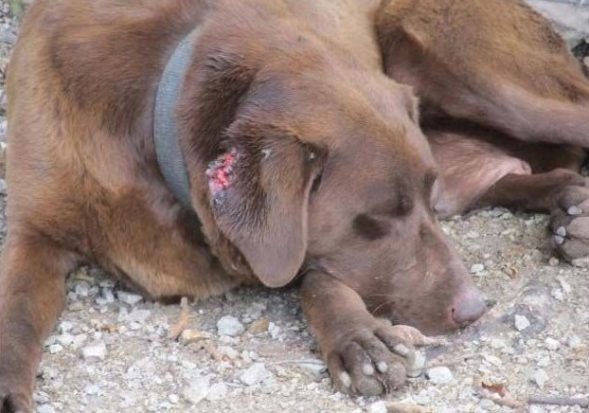
There are an estimated 190,000 breeding dogs kept in conditions that are barely legal at USDA-licensed puppy mills. USDA inspections, while infrequent and far from adequate, are often the only way to ensure that the animals’ most basic needs – like food, water, shelter from the cold and essential veterinary care – are met. Above, a dog at a USDA-licensed facility. Photo by USDA
The federal government shutdown, the longest in U.S. history, has devastated many American families. But it has also affected countless numbers of animals, including thousands of domestic and wild animals in puppy mills, research facilities, zoos and other facilities that are licensed — and inspected — by the U.S. Department of Agriculture.
The USDA is responsible for inspecting approximately 8,000 federally licensed animal facilities, including roughly 3,000 commercial pet breeders, more than 2,000 roadside and traveling zoos, circuses and other unaccredited attractions, and more than 1,200 research institutions. These entities are responsible for hundreds of thousands of animals for whom the occasional USDA inspection may provide the only protections against potential cruelty and neglect. USDA inspectors are also present at horse shows to ensure that Tennessee walking horses and related breeds are not subjected to “soring,” the intentional infliction of pain on the horses’ legs and hooves to produce an artificial gait known as the “big lick.”
We know that abuse and neglect of animals in these contexts does occur. Each year, HSUS staff members compile the Horrible Hundred report on problem puppy mills using USDA inspection data and other public records to document violations of the Animal Welfare Act and other laws by commercial dog breeders. On any given day, there are an estimated 190,000 breeding dogs crammed in tiny cages and kept in conditions that are barely legal at USDA-licensed operations. USDA inspections, while infrequent and far from adequate, are often the only way to ensure that the animals’ most basic needs – like food, water, shelter from the cold and essential veterinary care – are met.
At horse shows, data we’ve analyzed in the past show far fewer or no soring violations when inspectors from within the walking horse industry are providing oversight on their own, compared to when USDA inspectors are present.
The shutdown can potentially also impact farm animals slated for slaughter, because the USDA Food Safety and Inspection Program’s contingency plans on inspections during slaughter do not specifically address humane handling violations, leaving it unclear how or whether any potential animal welfare violations will be addressed.
It’s worth noting that the shutdown further exacerbates other problems with USDA inspections that have emerged in recent years. An October Washington Post report, for example, revealed that USDA enforcement against Animal Welfare Act violators dropped dramatically in 2018.
In a development that we have resisted with all available means, and that we are fighting with a lawsuit, the USDA also severely restricted public access to USDA inspection records on its public website and in response to records requests. In February 2017, the USDA purged critical information on the facilities it inspects from its website – information that groups like ours had relied on for years, and information that is gathered at taxpayer expense to which the public has a right of access.
The USDA also altered its inspection guide in 2018 to loosen rules regarding veterinary oversight and other critical protections for animals.
The situation at the USDA provides just a few examples of how damaging the shutdown has been in regard to critical oversight and regulatory functions of importance to animal welfare. The same thing is happening in other agencies of the federal government, with negative consequences for animals in other contexts.
The shutdown will end, eventually, but it is exacerbating a crisis at the USDA, coming in the wake of dramatic indicators of subpar performance during the past two years. Unless we see greater transparency and an improvement in USDA oversight of the facilities, the problems for animals trapped in these situations will not end anytime soon.
The post Thousands of animals in USDA-licensed facilities feel impact of government shutdown appeared first on A Humane World.
Enviroshop is maintained by dedicated NetSys Interactive Inc. owners & employees who generously contribute their time to maintenance & editing, web design, custom programming, & website hosting for Enviroshop.
